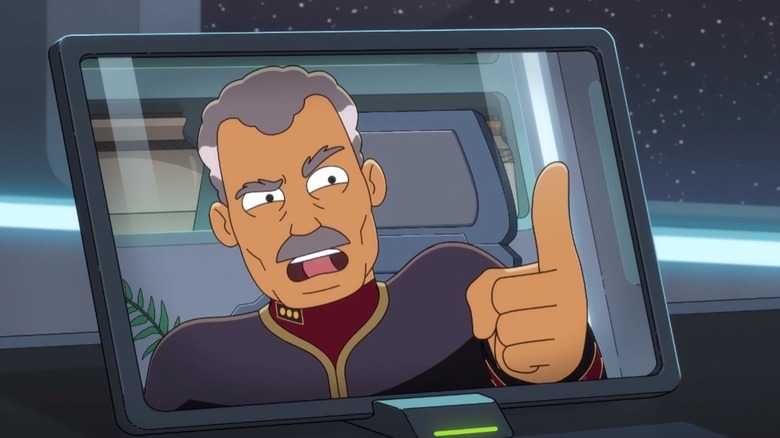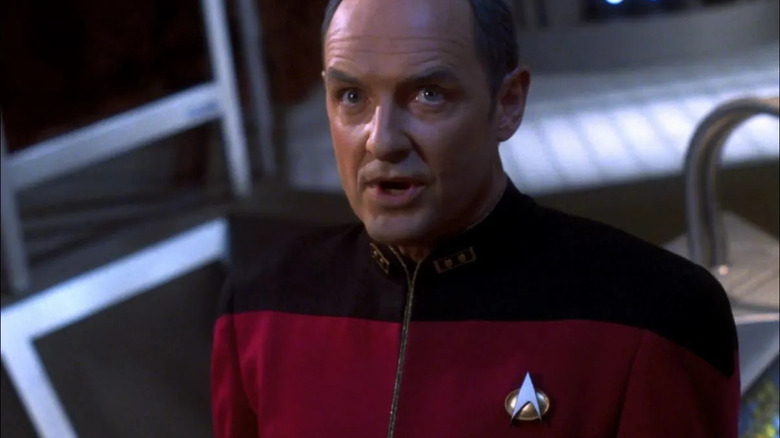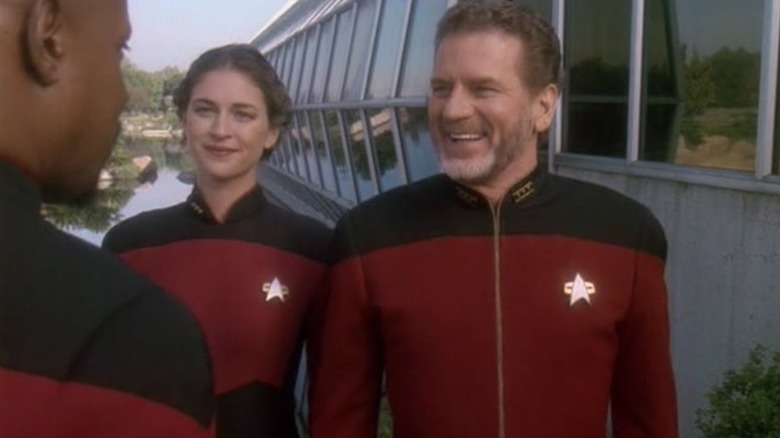Star Trek: Lower Decks Revives A Classic Trek Trope, Just In Time For The Season Finale
This post contains spoilers for the season finale of "Star Trek: Lower Decks."
In the last episode of "Star Trek: Lower Decks," the U.S.S. Cerritos found themselves under attack by a small armada of Breen warships. The California-class vessel was severely outmatched, and was at risk of being destroyed when a heretofore unseen starship, the U.S.S. Aledo, swooped in, destroyed the attackers and saved the day. The Aledo, it is later revealed, was an experimental Texas-class starship that was run entirely by artificial intelligence. There was no crew on board. The Texas class was the brainchild of one Vice Admiral Buen Amigo (Carlos Alazraqui), who sought to reduce both casualties and any human error in Starfleet by essentially replacing its officers with drones.
As any good Trekkie knows, creating an artificially intelligent machine is an enormous can of worms on "Star Trek," and giving both A.I. and weapons to a drone is asking for trouble. As is revealed in "The Stars at Night," deep in the heart of Texas-class vessels resides a computational error that makes their emotional matrix unstable. Eventually, the three robotic ships open fire on a Federation Starbase, killing hundreds. It takes the combined efforts of Starfleet's entire California class — the U.S.S. Culver City! The U.S.S. Santa Monica! The Carlsbad! The Merced! — to take out the Aledo, the Dallas, and the Corpus Christie. As the old saying goes, don't mess with California.
Vice Admiral Buen Amigo is killed in the battle, hoisted by his own petard. As it so happens, Buen Amigo is only the most recent example of "evil Admirals" in "Star Trek." Indeed, the trope of goes back many years.
The Insane Admiral
When Vice Admiral Buen Amigo reveals that he has been working on the Texas class for many years, knowing that it was a dangerous and ill-prepared endeavor, Captain Freeman (Dawnn Lewis) confronts him. He explains to the captain that being an Admiral is a career dead-end, and that grand, sweeping projects need to be regularly approved by Starfleet, else an officer stagnate. In outrage, Captain Freeman says "You are not one of those bad-faith Admirals that is up to no good!" He is, of course, that very thing. He is "one of those Admirals." Captains are typically trustworthy in "Star Trek." Admirals, however, must be looked on with suspicion. "Yes, I was killing people, but I was doing it for the greater good" should be the Admiral's motto.
There are, of course, many examples of evil Admirals throughout all of Trek. In the original series episode "The Doomsday Machine," Commodore Matt Decker (William Windom) is pushed to insanity by a planet-eating monster and takes over the Enterprise. In "Star Trek VI: The Undiscovered Country," Admiral Cartwright (Brock Peters) is part of a conspiracy to sabotage peace talks between the Federation and the Klingons.
There was Admiral Jameson (Clayton Rohner) in the "Next Generation" episode "Too Short a Season," who overdoses on age-reversing drugs and becomes wicked and pushy. Retired Rear Admiral Norah Satie (Jean Simmons), in the episode "The Drumhead," persecutes a half-Romulan Starfleet officer merely to defend a misguided sense of devotion to her dead father. In "The Pegasus," Admiral Pressman (Terry O'Quinn) has a secret mission to steal a cloaking/phasing device that allows ships to fly invisibly through solid matter, after having already killed his entire crew the first time he tested it.
But wait, there's more!
Vice Admiral Dougherty (Anthony Zerbe) is in league with the evil So'Na in "Star Trek: Insurrection" in a plot to forcibly relocate a village of aliens so that he could steal regenerative radiation from their planet's rings. On "Star Trek: Deep Space Nine," Admiral Leyton (Robert Foxworth) engages in a conspiracy to make Starfleet more militant and aggressive. Even Admiral Janeway (Kate Mulgrew) haphazardly goes back in time (!) in the "Star Trek: Voyager" episode "Endgame" to aid her less-impulsive younger self back to the Alpha Quadrant with future knowledge of Borg technology. The ethics of such a scenario are dodgy at best. Even the Kelvin timeline wasn't safe from the "insane Admiral" trope: Admiral Marcus (Peter Weller) secretly builds a battleship called the U.S.S. Vengeance in "Star Trek Into Darkness."
Trekkies might be waiting for mention of Admiral Nechayev (Natalia Nogulich), who was so frequently a fly in the ointment for Captain Picard (Patrick Stewart). While she was typically quite curt, and frustratingly believed in military tactics over diplomacy or safety, she was, surprisingly, never involved in anything nefarious. Audiences may have been given to ire at her actions, but Admiral Nechayev doesn't count as an insane Admiral.
So when Buen Amigo introduced artificially intelligent ships that were well-armed and intended to replace biological officers, all experienced Trekkies immediately smelled something fishy. On "Star Trek," the Admiralcy is accompanied by endless opportunities for corruption. Perhaps remaining a starship captain is not merely preferable for its opportunities for adventure and exploration, but to assure one's virtue.


